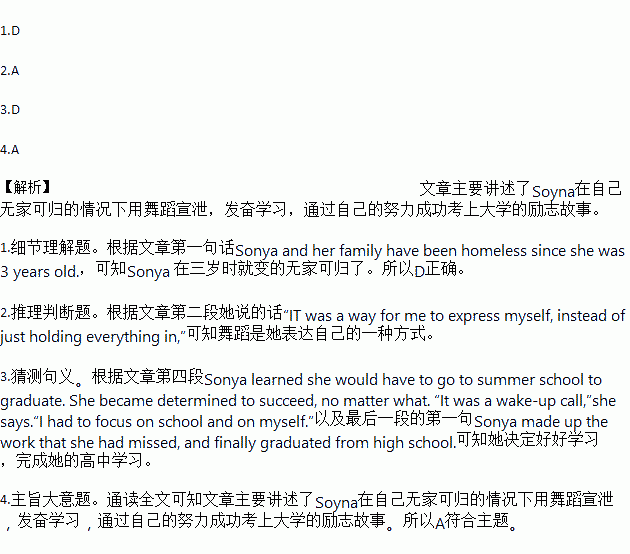题目内容
Sonya and her family have been homeless since she was 3 years old. Over the years, they have moved more than 15times to different shelters around New York City. Moving around was hard on Sonya。At school, Sonya hid her homeless from teachers and other students. She didn’t want to be treated differently from other kids.
In sixth grade, Sonya discovered a way to deal with some of her stress. She began studying dance at her middle school. “IT was a way for me to express myself, instead of just holding everything in,”she explains. Soon, Sonya auditioned(试演)for a summer dance camp run by Alvin Alley, a famous dance company. She was accepted. “I was excited,”says Sonya.
Dancing became an even more important part of Sonya’s life in high school. But things were not going well for Sonya at school. Each time her family moved to a new shelter, Sonya often took care of her younger sisters and brothers. She helped them get ready in the morning and took them to school. They would be on time, but Sonya would be late.
Worrying about her family kept Sonya from thinking about her own future. That changed the summer after 11th grade. Sonya learned she would have to go to summer school to graduate. She became determined to succeed, no matter what. “It was a wake-up call,”she says.“I had to focus on school and on myself.”
Sonya made up the work that she had missed, and finally graduated from high school. No one in her family had gone to college before. But in September 2015, Sonya enrolled in the State University of New York at Potsdam. She plans to become a doctor for kids and to teach dance to children who have disabilities.
1.According to the text, Sonya_____________.
A. learned to dance at the age of 3
B. kept moving to a better school
C. hid to secrets from her teachers
D. became homeless at an early age
2.From Sonya’s experience, we can infer__________.
A. she could express herself by dancing
B. teachers and other students laughed at her
C. Sonya determined to be a doctor for people with disabilities
D. her sisters and brothers stopped her from thinking about her future
3.By saying“IT was a wake-up call,” Sonya means that__________.
A. she needed to teach herself
B. she must support her family
C. she should focus on dancing
D. she had to finish high school
4.What’s the main idea of the text?
A. A girl finds hope through dance.
B. Dancing makes people confident.
C. Sonya dreams of becoming a dance star.
D. More and more kids stay at shelters in New York.
 考前必练系列答案
考前必练系列答案

 ou are donkeys,” said the man.
ou are donkeys,” said the man. saw the zebras. They asked the zebras where they came from. When the zebras told the donkeys their secret, the donkeys all rushed to see the old man.
saw the zebras. They asked the zebras where they came from. When the zebras told the donkeys their secret, the donkeys all rushed to see the old man.